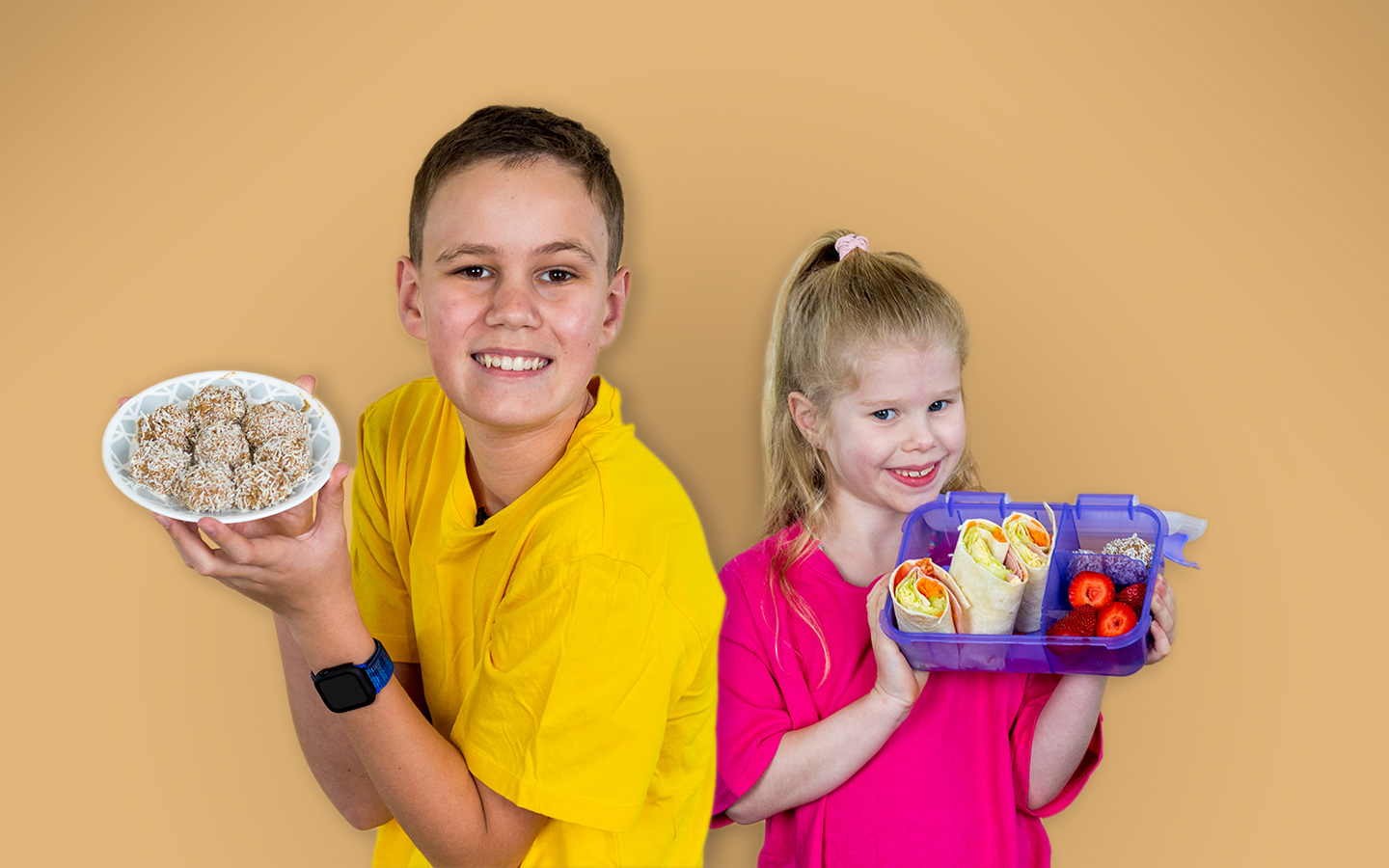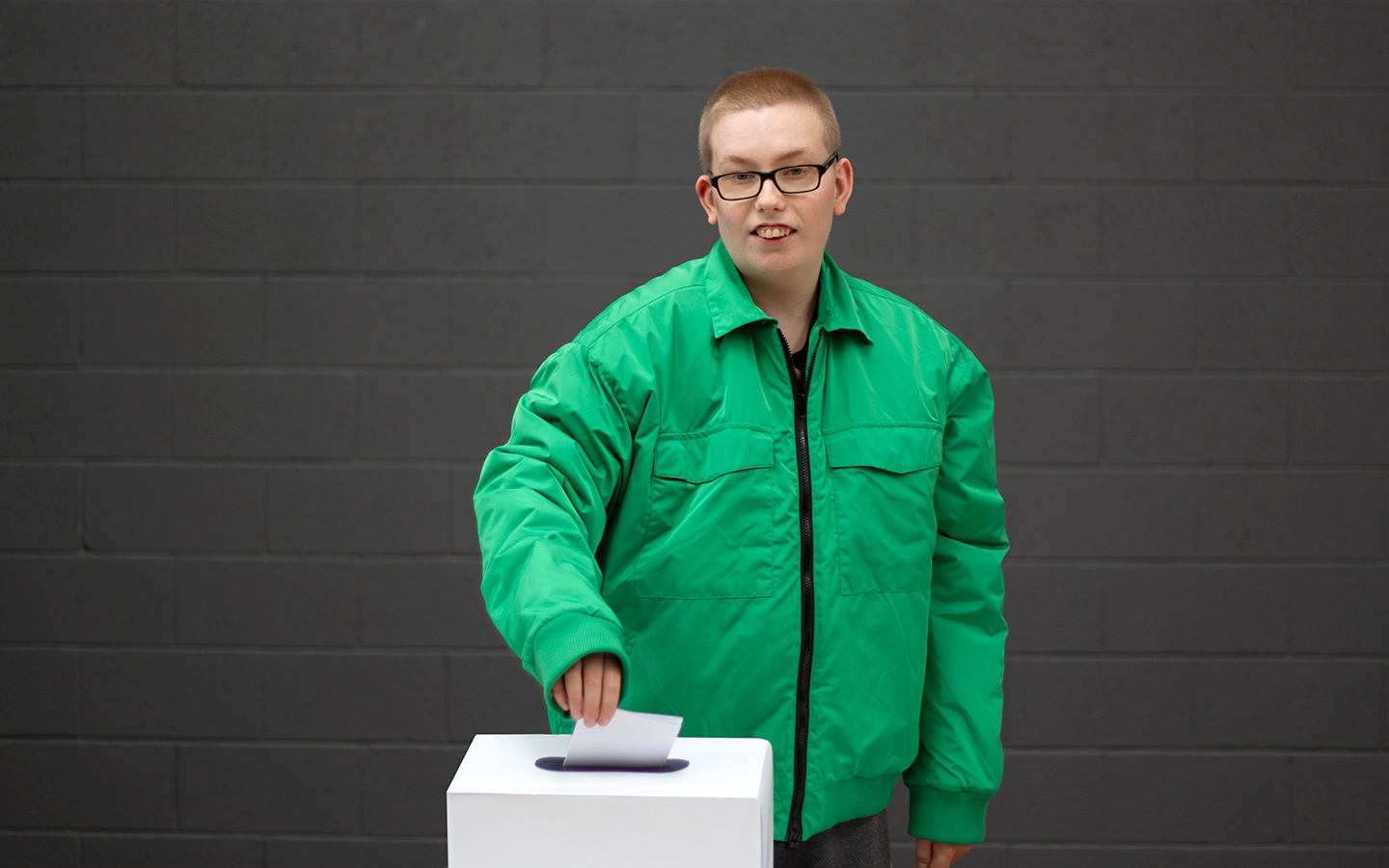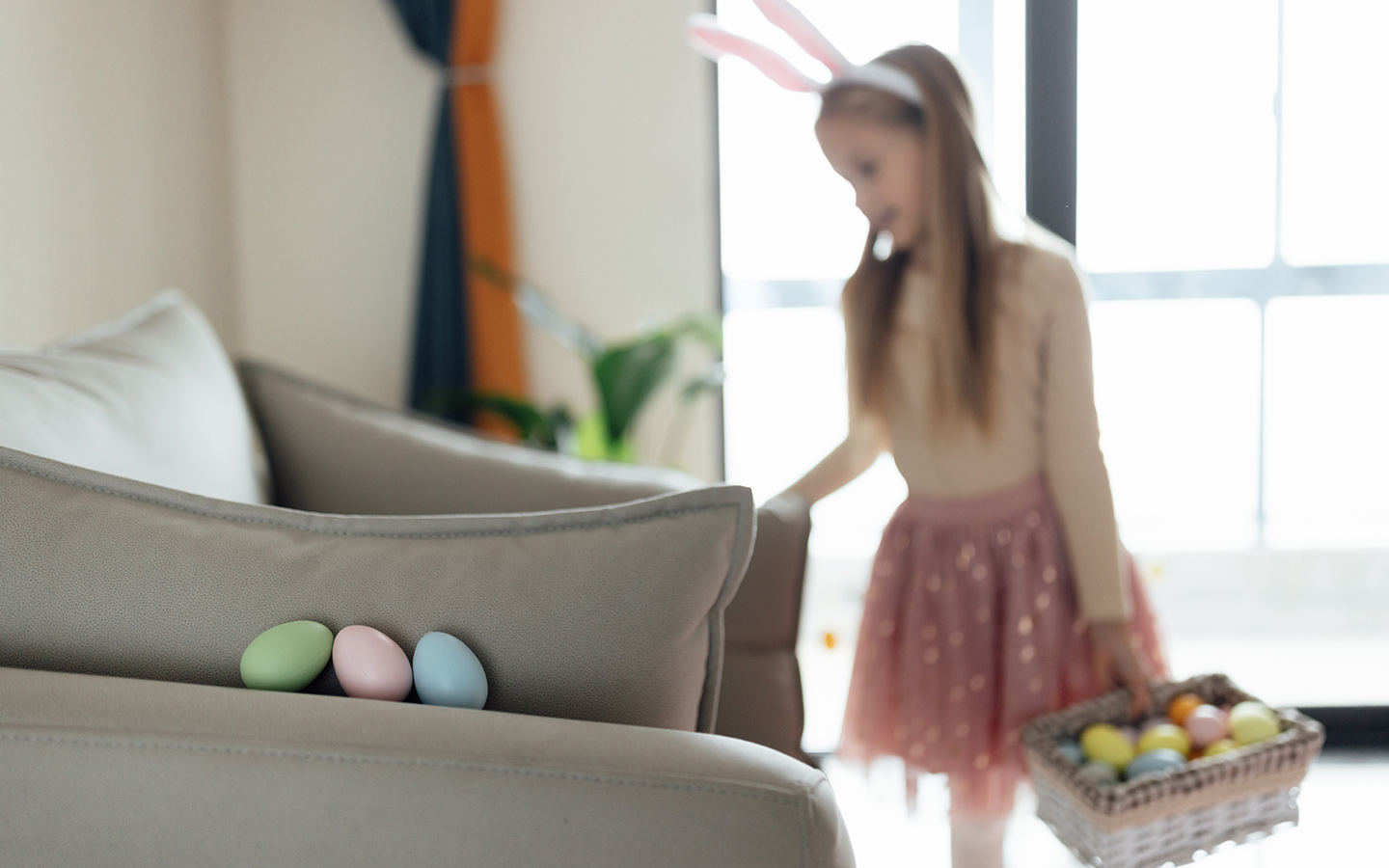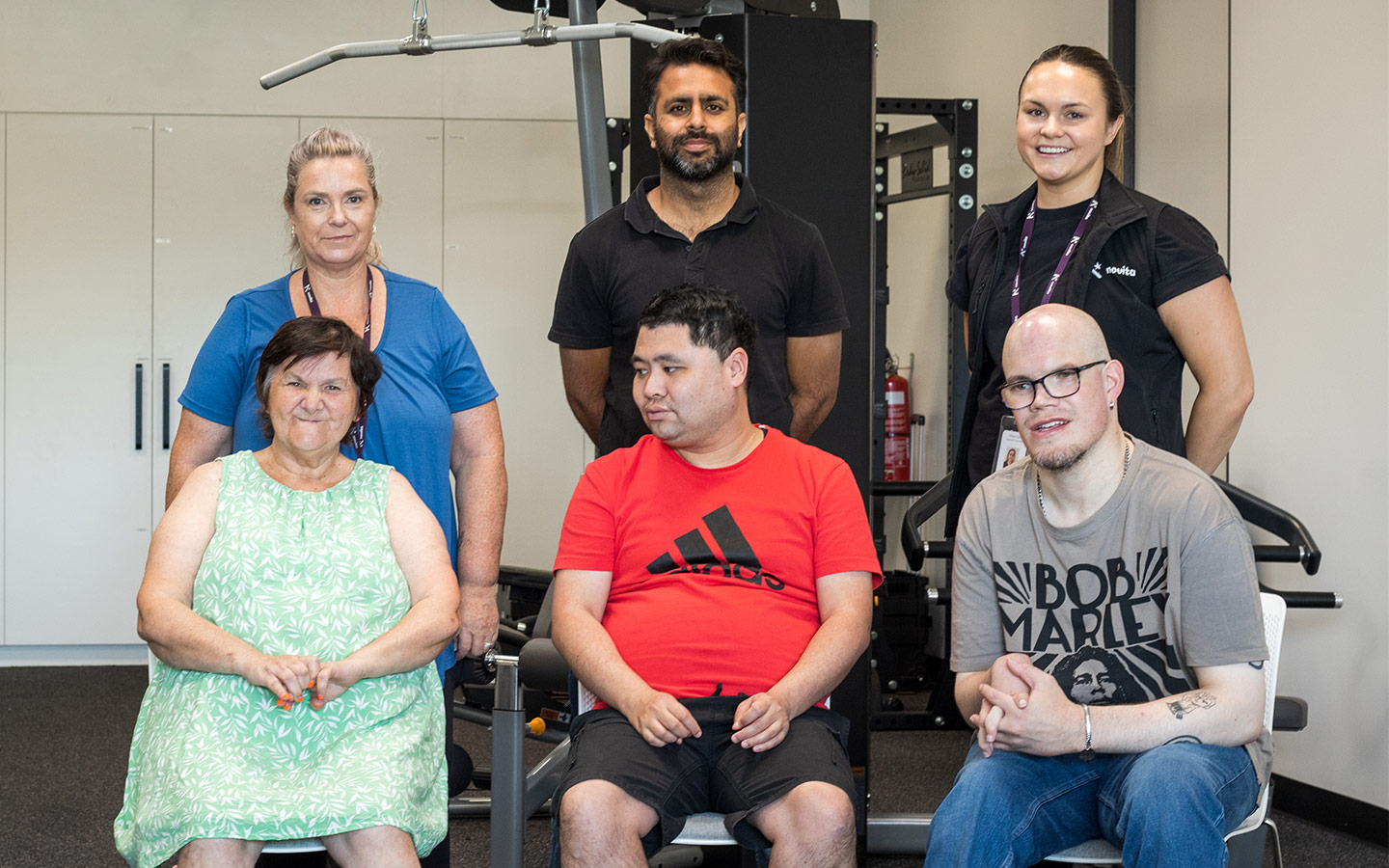It’s that time of the year again – school holidays are coming to an end and school is fast approaching. It’s back to preparing the kids lunch boxes for school. Did you know, you can work towards your kid’s therapy goals all whilst making yummy lunches?
Cooking is the perfect activity you can do with your kids, whether they are looking to become a little Master Chef, or just wanting to learn the basics. It is a great way to keep the kids entertained and teach them a variety of important life skills.
Compared to the general population, kids with disability can be at a greater risk of developing certain diet-related health conditions. Cooking is a great way to teach your kids the importance of healthy eating from a young age and encourages your kids to learn to make healthy lunch boxes, instead of ordering canteen food at school. What’s more, involving your kids in preparing healthy lunch boxes, can create habits that will have lifelong benefits.
Novita kids, James and Isabel have created some recipes that are perfect for your kid’s lunch boxes! These are some of our favourite recipes for lunch boxes that you can make at home. They are super easy, healthy, and your kids will love them!
Kid friendly Banana bites recipe
Ingredients:
- 2 bananas large mashed
- 1 cup rolled oats raw
- 1 cup pitted dates chopped
- 1 cup shredded coconut
Appliances and utensils:
- Blender
- Cutting board
- Container
- Fork
Method:
- Combine the mashed banana with the oats and dates in a blender for 1 minute.
- Place the mixture in the fridge for 30 minutes, or until firm.
- Roll the mixture into small-sized balls in your hands.
- Coat the balls in shredded coconut and store in the fridge.
Ham and Salad Wrap recipe
Ingredients:
- 1 packet wraps
- 6 slices ham
- 1 head cos lettuce
- 1 avocado
- 1 carrot
- 2 tomatoes
- ½ block cheese
- Mayonnaise praise
Appliances and utensils:
- Cutlery set
- Rocker Knife
- Grater
- Tongs
- Bowls
- Chopping board
- Foil
* Cutlery set and Rocker knife are available to purchase at NovitaTech.
Method:
- Collect all ingredients and utensils
- Rinse lettuce and tomatoes under cold water
- Slice lettuce and tomatoes. Set aside
- Grate cheese and place in bowl
- Grate carrot place in bowl
- Cut avocado in half. Be careful to cut around the seed.
- Cut the avocado into match sticks and place in bowl.
- Place open wrap on board. Add 1 handful of shredded lettuce, slice of ham, some grated carrot, 2 slices of tomato, mayonnaise and 1 handful cheese to centre of wrap.
- Fold one side of wrap over fillings. Fold bottom of wrap upwards. Fold remaining side of wrap and hold.
- Wrap the wrap in foil to seal.
Cooking as a sensory activity
Sensory play is important for your kids development. It allows the building of nerve connections in the brain, allowing kids to complete more complex learning tasks as they develop. Cooking can be a great sensory activity for you and your kids! Improving kids sensory skills is a major goal of therapy groups, and what a better way to develop these skills than bonding as a family over food. We’ve listed some things you can do to turn cooking into a fun, sensory, learning activity for your kids.
For example, using herbs in your recipes can stimulate your kids’ sense of smell. These scents will have varying effects, such as calming, and relieving stress that can relax them. Allow your kids to smell different scents and let them describe them to you.
Introducing your kids to different textures by touch allows them to become familiar with different ingredients. You can ask them to explain the texture – if the ingredient is rough, smooth, soft or hard? Exploring different textures of foods through taste, can teach your kids to explore their senses, and try some new foods. You can tell your kids to close their eyes and taste different foods to guess the ingredient and encourage them to try strong flavours. For example – a sour food, salty food and sweet food. Ask them about the differences.
Did you know that playing soft music while cooking can help relax your kids? Soft music can focus kids’ attention on the task at hand. Improve your kids’ sensory skills by allowing them to do the heavy work – this can support them to stay attentive on the task. For example – mixing ingredients, mashing potatoes, etc.
Exposing your kids to different temperatures such as ingredients from the fridge and food out of the oven (with parental supervision to ensure it is not too hot) is a great sensory activity. This can teach your kids about food safety and learning the foods that require refrigeration such as raw meats. It is encouraged to use a variety of different ingredients that are beneficial to the sensory experience. You can expose your kids to different textures by adding extra ingredients to help them become more familiar and comfortable.
Make cleaning up fun! When washing the dishes, fill the sink with soap and water and let your kids play with the water. This will be fun, and they will also be cleaning the dishes at the same time!
Did you know that Cooking can support kids therapy goals?
Following a recipe can enhance your kid’s communication and reading comprehension skills. You can encourage this by having your kids read a recipe out loud and support them to speak by asking questions about the recipe. Cooking can improve language development in your kid’s vocabulary –labeling ingredients will help them become familiar with the names of new ingredients. Cooking provides an opportunity to develop your kid’s math’s skills through measuring ingredients of a recipe. Your kids will learn measuring skills such as working with cups, tablespoons and teaspoons. They will also become familiar with fractions and basic addition and subtraction skills. Practicing these skills are a great way to support your kids therapy goals.
Cooking enhances kids learning skills
Cooking can support your kids by teaching them to learn to use both hands. This is an important everyday skill that allows your kids to hold a book to write in, and keep their school bag stable when unzipping it. Cooking is a great way to challenge your kids by performing basic cooking tasks such as mixing, pouring, stiring, squeezing, cutting and scooping. Cooking allows your kids to practice writing and using the pincer grip, which involves use of the first two fingers and thumb to work together to use a pencil. Using the pincer grip is important for your child to be able to write with the least amount of stress on their fingers, hand, and wrist.
Do your kids struggle to focus and pay attention on everyday tasks?
With school going back, it’s important to introduce activities to allow your kids to practice focusing and paying attention. Cooking is a great activity you can do with your kids to support them in becoming more patient, which can be challenging at times for all. Firstly, it’s a good idea to choose short and simple cooking tasks that match kids’ skills and attention span. Make sure you select a suitable recipe that isn’t too complex or have too many steps to follow. A recipe that is too challenging may result in a loss of focus and attention on the task, and they are more likely to give up. Cooking teaches kids to learn to be patient, by having to follow multiple steps, and waiting for food to cook.
Did you know that cooking can boost personal development in kids?
Learning how to cook is an important skill that you can practice with your kids! Cooking allows you to support your kids towards achieving their therapy goals by enabling them to live more independently in the future. Cooking can increase independence in your kids by teaching them to prepare their own meals and to clean up after themselves. As your kids spend more time cooking, this boosts their self-esteem, increases their self-confidence and gives them a sense of satisfaction and accomplishment.
Do you struggle to get your kids involved in cooking? We know that kids learn and engage best through fun activities and play. Did you know that we offer a range of therapy groups including cooking school to develop your kids’ social skills, movement and fitness, and learning? Our therapy groups support the development of new skills in a way that is meaningful for kids. We also know that YOU are a key member of your kid’s therapy team, which is why we offer groups and training for parents and carers that provide you with the skills to support your kids…everywhere!
For more information on our groups for kids, young people, and parents, head to novita.org.au/groups/. You can call us at 1300 668 482 or visit our Contact Us page for more ways to get in touch.



